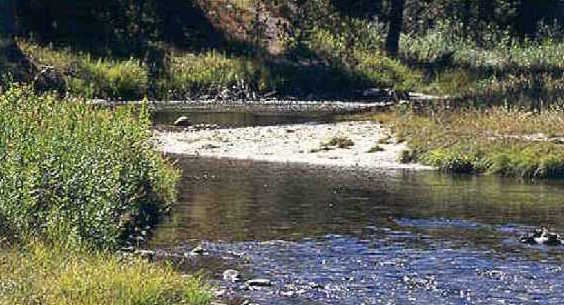by Laurie Gudim
I used to have an alternative to Sunday morning worship that I called “fishing church”. I would put my fishing pole and bait in the car early in the morning and drive up a beautiful little canyon choked with cottonwoods and aspen. Pulling in at a regular spot, I would grab my gear and a canteen of water and follow the dirt trail that abutted the parking area to a secret place along the young river that drained the canyon. There was a huge boulder that always caught the first rays of the sun, and below it the best fishing hole in the world.
I would set up my things and cast in my line. An eddy would carry the baited hook back and forth through the water, drawing it deeper with every pass. I would listen to the murmur of the river and watch the bubbles that floated up from the depths and the play of sunlight on stone and leaf as the sun crept into the sky.
The sacrament of sun on water, mountain air, the flit of tiny birds and the quiet appearance of deer, raccoon and squirrels – once a bobcat – would center me. Sometimes a muscled pull on the line in the water would herald a treasure soon to be gathered from the depths. I don’t remember praying much, or even thinking. There was just the vision of light rocking through the eddy, the rush of falling water, and behind it all, silence.
The other church, my local human one, was very troubled back in those days. Sometimes going into the sanctuary was excruciating for me. Misunderstandings had isolated me; people were disgusted with me. Many wished I would just go away for good.
It was others that drew me: those hurt by what they assumed I had done, disillusioned by what they had heard people say about me. Against all odds, they still cared about me – or maybe just hoped that I would care about them. They felt betrayed, but we had a history together. Though they hadn’t a clue how to do it, they wanted to work things out.
Today in the U.S., which is so fraught with very scary societal growing pains, that kind of sustaining love is rare. But in the church we intentionally cultivate relationship. We struggle to love one another as Christ commanded. We hold out our hand to our enemies, real or imagined. We hold the door open to those who are different from us, and also to those who have offended us. Sometimes we do it well; other times we fall far short. But we understand that another way of saying “we fall short” is “we sin”.
We struggle to love those we don’t even know, offering blankets and food, medical attention, advocacy and good listening. Turning ourselves loose on the world, we try to bring our experience of Christ, our hands-out/hands-on deep knowing, out of our sanctuaries and into community. How do we translate what we know so that Christ’s love moves through us like water, like nourishing moisture from the high places of our spiritual understanding?
That’s always the question in Christian community: how do we love? How do we make ourselves better at it? How do we go further into it? How do our disciplines and our sacraments, our “continuing in the apostles’ teaching and fellowship, in the breaking of bread and in prayer,” lead us into deeper love?
Fishing church was an occasional respite for me from the demanding, heart rending, sometimes satisfying work of the love of other human beings. Love is Christ’s central commandment – love one another as I have loved you. Nothing can be more powerful, more important than that. It is our work.
Here’s hoping we get ever better at it, because the world needs us right now. “Love one another as I have loved you,” Christ commands us. May we intentionally, with steadfast resolve, strive to do that well.
Laurie Gudim is a writer and religious iconographer who lives in Fort Collins, CO. You can view some of her work at Everyday Mysteries.
Image: From Wikimedia Commons, Silver Creek near Crouch in Blaine, County Idaho United States Forest Service

